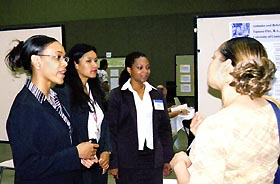|
This is an archived article.
For the latest news, go to the Advance
Homepage
For more archives, go to the Advance Archive/Search Page. |
||
|
Mentoring Program Helps Minorities
Pursue Graduate Studies in Psychology By Sherry Fisher When Felicia Griffin was a sophomore taking psychology courses, she had no idea which career path to follow. A special program at UConn changed that: Griffin is now at the University working on her Ph.D. in clinical psychology and plans to teach the subject at the college level.
Griffin is one of dozens of students who have participated in UConn's Minority Advancement Program in Psychology. The mentoring program is offered by the psychology department to qualified students from underrepresented groups who are interested in majoring in psychology and plan to pursue graduate study. "The purpose of M.A.P.P. is to prepare students of color for graduate school and thus, potentially, increase the diversity among psychologists," says Michelle Williams, an associate professor of psychology and African American studies, who directs the program and serves as a faculty mentor. This year was particularly successful: Four students from the M.A.P.P. program entered doctoral programs in clinical psychology. The program offers opportunities, resources, and guidance to students who maintain high academic standards. Students are encouraged to join the volunteer program as freshmen. "The most effective mentoring begins early," Williams says. Participants meet as a group each week with a member of the psychology faculty, and graduate student mentors are made available to each. As M.A.P.P. members become upperclassmen, they also become mentors to others. A core group of eight to 10 students usually attends the weekly meetings, Williams says, where they receive advice on courses, fellowships and financial support, help in preparing for the Graduate Record Exams, and assistance in applying to graduate school. They also work on a group research project. For this project, students collect data as a group and then pair up to work on individual projects. "The research projects really boost the students' confidence," Williams says. "I push them to present their work at conferences, even if it's something local. It instills in them the belief that 'I can do this. It's not quite as intimidating as I thought it would be.'" A current student and a recent graduate recently presented research they started in M.A.P.P. at a national conference. Tamora Callands, a senior, and Tajuana Elzy, a May graduate, presented their research on attitudes and beliefs about interracial dating at a session of the American Psychological Association meeting in Chicago last month. It is rare for undergraduates to present at the APA, Williams says. The conference is geared toward professionals and most presenters are psychologists or graduate students. Griffin says she didn't know what possibilities there were in psychology until she joined M.A.P.P. "I began to learn about the career options," she says. "The program also helped me develop interests and exposed me to research that I hadn't found in textbooks." Callands, who is M.A.P.P.'s president, has enjoyed mentoring other students. "It makes me feel I'm helping people," she says. Williams says graduate students of color are an inspiration to undergraduates in the program. "Students are intimidated by the thought of graduate school," she says. So each year, she asks graduate students of color from the different divisions in the psychology department to talk about their experiences: "What it was like for them; what were the barriers; how many people told them they wouldn't be able to do it; who told them they could; what did they do to get where they are." Williams wants the students in M.A.P.P. to understand that "each class is a step further to their goals. They're not just here to graduate from college. They're here to go someplace else. And they should treat college as the stepping stone to get to that someplace else." |

